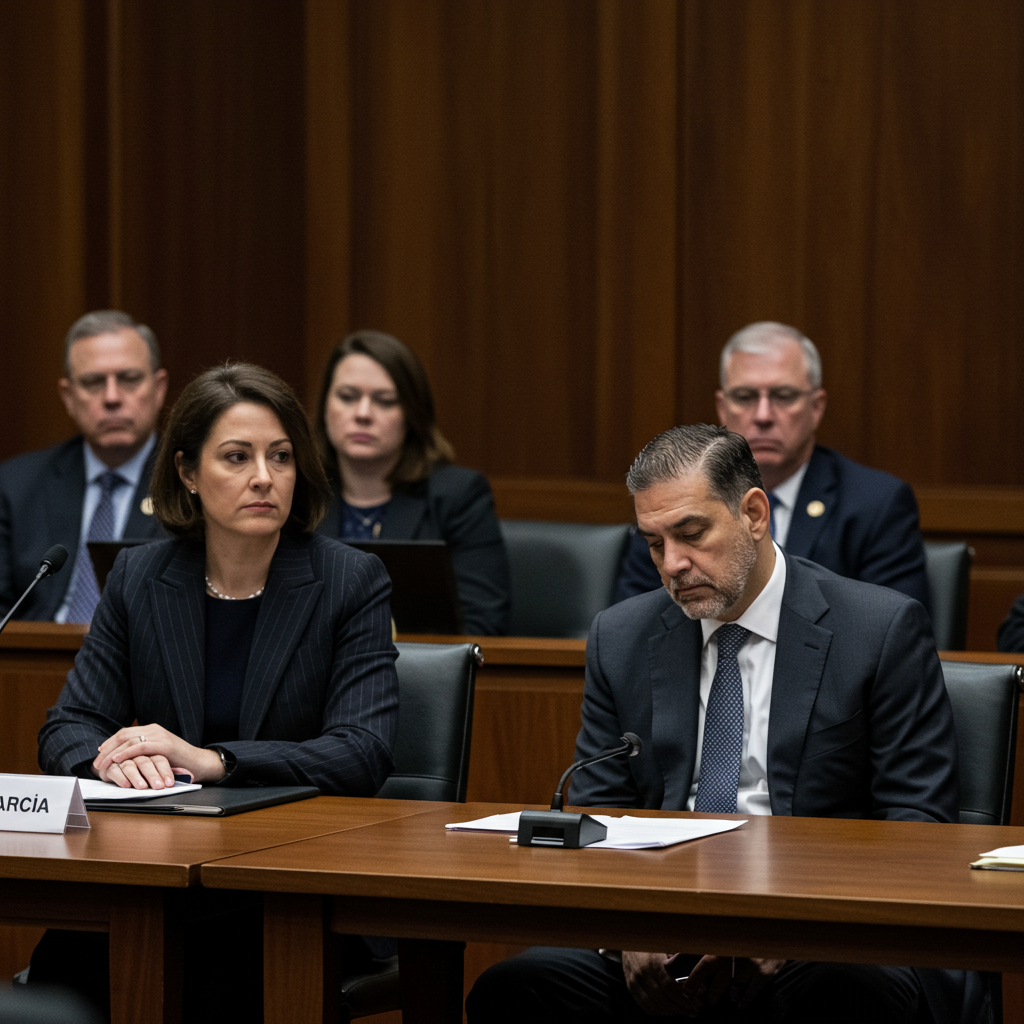Salvadoran Deportee Back in US Amid Migrant Smuggling Indictment
Kilmar Ábrego García, a 29-year-old from El Salvador whose deportation in March sparked a legal firestorm, has been returned to the United States to face serious federal criminal charges. The development follows a protracted legal and political battle after he was controversially sent back to his home country despite a standing US court order protecting him from removal.
Mr. Ábrego García appeared in a Tennessee federal court this week after El Salvador agreed to release him following the presentation of a US arrest warrant. His return puts him back in the American justice system, though his lawyers vehemently argue the circumstances constitute an “abuse of power.”
Facing Federal Charges for Alleged Smuggling Ring Role
The federal charges against Mr. Ábrego García stem from a two-count grand jury indictment unsealed in a Tennessee court. He is charged with conspiracy to transport aliens and unlawful transportation of undocumented aliens.
US Attorney General Pam Bondi stated the grand jury found Mr. Ábrego García played a “significant role” in an alien smuggling ring. The indictment alleges a years-long conspiracy, spanning from approximately 2016 through 2025, to transport thousands of undocumented migrants from Texas to other parts of the country, including Maryland. Prosecutors claim he participated in over 100 such trips, moving individuals from various Central American countries through Mexico and across the US border. Allegations in the indictment include transporting unaccompanied minors and members or associates of MS-13, a transnational criminal organization designated as a foreign terrorist group by the US.
While not included in the specific charges he faces, authorities, including Attorney General Bondi and government filings, have made additional claims outside the indictment, such as allegations of transporting weapons and narcotics for gangs, alleged MS-13 membership, potential involvement in a murder in El Salvador, and even soliciting illicit images from a minor.
Evidence cited in detention motions includes a 2022 traffic stop in Tennessee where Mr. Ábrego García was pulled over for speeding with multiple passengers, who he claimed were construction workers. Although only warned for an expired license at the time, body camera footage reportedly showed troopers suspected human trafficking. Investigators pursuing this incident later interviewed Jose Ramon Hernandez-Reyes, the vehicle owner, who allegedly stated under limited immunity that he ran a “taxi service” and hired Mr. Ábrego García multiple times since 2015 to transport migrants from Texas.
Controversial Deportation Ignited Legal Battle
Mr. Ábrego García’s case gained national attention due to the circumstances of his deportation. In 2019, after entering the US illegally as a teenager and being detained by federal immigration authorities, an immigration judge granted him “withholding of removal,” a protection status based on a credible fear of persecution by gangs if returned to El Salvador.
Despite this protection, he was deported on March 15, 2025, amid immigration crackdowns by the Trump administration, reportedly under the wartime Alien Enemies Act. Government lawyers initially described the deportation as an “administrative error.” Upon arrival in El Salvador, Mr. Ábrego García was sent to the notorious Cecot mega-prison, known for harsh conditions, before reportedly being moved to a different facility.
His deportation directly defied the 2019 immigration court order, sparking a weeks-long legal confrontation. U.S. District Judge Paula Xinis in Maryland ordered the government to facilitate his return, a ruling unanimously affirmed by the U.S. Supreme Court on April 10. The high court ruled his removal was “illegal.”
However, the Trump administration reportedly resisted complying with the court orders, at times invoking the state secrets privilege or suggesting his return was solely at the discretion of El Salvadoran President Nayib Bukele. Judge Xinis issued a sharp rebuke, ordering the administration to provide substantive information and describing their previous responses as a “willful and bad faith refusal” to comply, stating, “That ends now.” Political pressure, including advocacy and a visit by Maryland Senator Chris Van Hollen to El Salvador, also played a role in bringing the issue to light and pushing for his return.
Legal Proceedings Underway in Tennessee
Following his return, Mr. Ábrego García made his initial court appearance before US Magistrate Judge Barbara Holmes in Nashville, Tennessee, on June 6. Appearing confused and reportedly facing translation difficulties, he was ordered to remain in federal custody.
The government has requested he be held in pretrial detention, arguing he poses a danger to the community and is a serious flight risk, citing the severity of the potential sentence (up to 10 years per alien transported).
An arraignment hearing, where he is expected to formally enter a plea and the court will consider the government’s detention motion, is scheduled for June 13.
Defense Calls Charges “Abuse of Power”
Mr. Ábrego García’s legal team maintains his innocence and argues the criminal charges are a response to the government’s mishandling of his deportation. Simon Sandoval Moshenberg, one of his attorneys, called the charges “preposterous” and the entire series of events an “abuse of power.” He accused the government of “disappearing” his client to a foreign prison in violation of a court order and now bringing him back to prosecute him rather than correct their error. Sandoval Moshenberg asserted that due process requires a chance to defend oneself before punishment, not after.
His lawyers deny that Mr. Ábrego García, described as a sheet metal worker who lived in Maryland with his US citizen wife and child, is the leader of an international MS-13 smuggling conspiracy. They state he has no prior criminal convictions in either the US or El Salvador, including for gang membership. His wife has suggested his prior traffic stop with passengers might have been related to transporting construction workers.
The decision to pursue the indictment has reportedly generated controversy, with sources suggesting it led to the abrupt departure of a high-ranking prosecutor in Nashville due to concerns about political motivation.
Speaking on the matter, President Donald Trump called Mr. Ábrego García a “bad guy” and supported the decision to return him for trial. Senator Van Hollen emphasized that the core issue is about upholding constitutional rights and due process for all individuals, regardless of the specific person. El Salvadoran President Nayib Bukele stated his country would not refuse a US request to return a “gang member” to face charges.
As Mr. Ábrego García remains in federal custody awaiting his next court date, his case continues to highlight the complexities of immigration enforcement, due process, and the interplay between the executive and judicial branches.
References
- https://www.bbc.com/news/articles/c7v7ynv98r8o
- https://www.npr.org/2025/06/06/nx-s1-5425509/kilmar-abrego-garcia-el-salvador-deport-cecot-maryland-ice
- https://abcnews.go.com/US/mistakenly-deported-kilmar-abrego-garcia-back-us-face/story?id=121333122
- https://www.cbsnews.com/news/kilmar-abrego-garcia-indicted-us-el-salvador/
- https://www.nbcnews.com/news/us-news/kilmar-abrego-garcia-was-mistakenly-deported-el-salvador-will-face-fed-rcna211514




